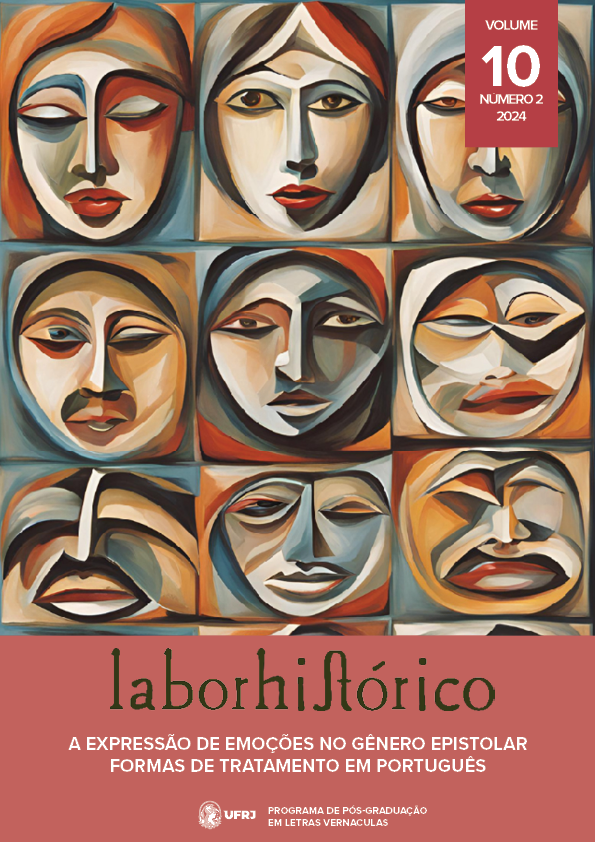“Minha jóia querida”: A linguistic analysis of the forms of adress in Antonio Lobo Antunes's War letters.
DOI:
https://doi.org/10.24206/lh.v10i2.62141Keywords:
António Lobo Antunes, Forms of Adress, Emotions, Epistolary Genre, Interpersonal RelationsAbstract
In this work, we seek to demonstrate how the linguistic resources deployed in epistolary forms of address attest the construction and/or evolution of emotions and interpersonal relationships of its author and their representations. To do so, we analyze all the war letters written by António Lobo Antunes (ALA), during the
Portuguese Colonial War and compiled in the book D’este viver aqui neste papel descripto (2005), highlighting three distinct periods: before the birth of his daughter, before the author received photographs of his daughter, and after seeing some of these records. Our work focuses essentially on describing the linguistic strategies associated with the forms of address in love letters as markers of intimacy, drawing on contributions from epistolary theory – such as Haroche-Bouzinac (1995), Diaz (2002), and Seara (2008) – in love epistolarity – e.g. Brenot (2000) – and from the discursive-pragmatic studies of ALA’s war letters – e.g. Seara (2009). The detailed analysis of the aspects listed allows us to systematize how the linguistic resources
deployed in these constructions provide clues to understanding the evolution of the author’s interpersonal relationships, as it is a coded writing that stems from spontaneous expression.
Downloads
References
AMOSSY, Ruth. La Lettre d’amour du réel au fictionnel. In: Jürgen Siess (dir.). Le Lettre, entre réel et fiction. Paris: Sedes, 1998, pp. 73-96.
AMOSSY, Ruth. (dir.). Images de soi dans le discours. La construction de l’ethos. Lausanne, Paris: Delachax et Niestlé, 1999.
ARAÚJO CARREIRA, Maria Helena. Modalisation linguistique en situation d’interlocution: proxémique verbale et modalités en portugais. Louvain-Paris: Éditions Peeters, 1997.
ARAÚJO CARREIRA, Maria Helena. La désignation de l’autre en portugais européen: instabilités linguistiques et variations discursives. In: Instabilités linguistiques dans les langues romanes, Travaux et Documents. 16 (org. Carreira, Maria Helena Araújo), Paris: Université Paris 8, 2002, pp. 173-184.
BRENOT, Patrick. De la lettre d’amour. França: Zulma, 2010.
BROWN, Roger & GILMAN, Albert. The Pronouns of Power and Solidarity. In: Sebeok, A. Thomas (Org.). Style in Language. Cambridge, MIT Press, 1960, pp. 253-276.
CINTRA, Luís Filipe Lindley. Origens do sistema de formas de tratamento do português atual. In: Brotéria (Lisboa), LXXXIV, n.º1, 1967, pp. 49-70.
COULMAS, Florian. Introduction. In: F. Coulmas (ed.). Conversational Routine, Explorations in Standardized Communication situations and prepatterned speech. Paris/New York: The Hague, Mouton Publishers, 1981, Vol. 2, pp. 1-2.
DIAZ, Brigitte. La Lettre ou la pensée nomade. Paris: Presses Universitaires de France, 2002.
DUARTE, Isabel Margarida. Falar Claro a Mentir. In: Dar a Palavra à Língua – Homenagem a Mário Vilela. Faculdade de Letras da Universidade do Porto, 2005, pp. 291-299.
DUARTE, Isabel Margarida. Formas de Tratamento em Português. Entre léxico e discurso. In: Matraga, v.18 n.28, 2011, pp. 84-101. Disponível em: http://hdl.handle.net/10216/75411
GOUVEIA, Carlos. As dimensões da mudança no uso de formas de tratamento em Português Europeu. In: O Fascínio da Linguagem: Actas / Colóquio de Homenagem a Fernanda Irene Fonseca. Universidade do Porto e Centro de Linguística da Universidade do Porto, 2008, pp. 91-99.
HAROCHE-BOUZINAC, Geneviève. L’Épistolaire. Paris: Hachette, 1995.
KERBRAT-ORECCHIONI, Catherine. L'énonciation: De la subjectivité dans le langage. Paris: Armand Colin, 1980.
KERBRAT-ORECCHIONI, Catherine. L’Implicite. Armand Colin, 2ème édition, 1986.
KERBRAT-ORECCHIONI, Catherine. L’interaction épistolaire. In: Jürgen Seiss (dir.). Le Lettre, entre réel et fiction. Paris: Sedes, 1998, pp. 15-36.
MELANÇON, Benoît. Diderot Épistolier, Contribution à une poétique de la lettre familière au XVIIIe siècle. Québec, Bibliothèque Nationale du Québec, Montréal: Éditions Fides, 1996.
NASCIMENTO, Maria Fernanda, Bacelar do. Formas de tratamento. In: Gramática do português, editado por Eduardo Buzaglo Paiva Raposo et al. 3º vol., Lisboa: Fundação Calouste Gulbenkian, 2020, pp. 2701-2734.
SEARA, Isabel. Da epístola à mensagem electrónica. Metamorfoses das rotinas verbais. Tese de Doutoramento. Universidade Aberta, 2007.
SEARA, Isabel. A Palavra Nómada. Contributos para o Estudo do Género Epistolar. Estudos Linguísticos/ Linguistic Studies. Lisboa: Edições Colibri/ CLUNL, 2008, pp. 121-144.
SEARA, Isabel. A Confissão Intimista na Correspondência Amorosa de António Lobo Antunes: estudo pragmático. In: Língua portuguesa: ultrapassar fronteiras, juntar culturas. Évora, 2009.
SILVA, Manuela Parreira. Realidade e ficção: para uma biografia epistolar de Fernando Pessoa. Lisboa: Assírio e Alvim, 2003.
VILLALVA, Alina. Formação de palavras: afixação. In: M. H. Mira Mateus, A. M. Brito, I. Duarte & I. Hub Faria (Eds.), Gramática de Língua Portuguesa, Caminho, 2003, pp. 939-965.
Downloads
Published
Issue
Section
License
Copyright (c) 2024 Mariana Ninitas

This work is licensed under a Creative Commons Attribution-NonCommercial 4.0 International License.
Authors who publish with this journal agree to the following:
a. The authors hold copyright of the published papers; authors are the sole responsible party for published papers content; the published paper is licensed under a Creative Commons Attribution-NonCommercial 4.0 International License which allows the sharing of the publication as long as there is acknowledgement of authorship and publishing by Revista LaborHistórico.
b. Authors should seek previous permission from the journal in order to publish their articles as book chapters. Such publications should acknowledge first publishing by LaborHistórico.
c. Authors may publish and distribute their papers (for example, at institutional repositories, author's sites) at any time during or after the editorial process by Revista LaborHistórico.


